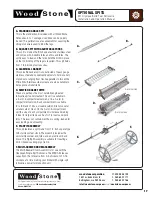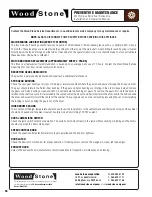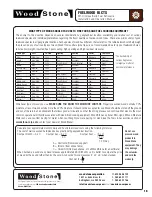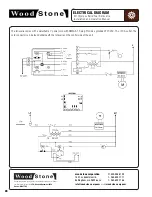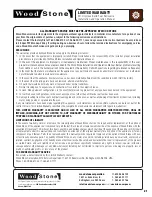
19
Mt. Olympus Solid Fuel Rotisserie
Installation and Operation Manual
FUELWOOD FACTS
An ongoing program of product improvement may require us to change
specifications without notice.
SFR, Revised November 2014.
Doc no: M0057.02
or visit
woodstone-corp.com
wood stone corporation
1801 w. bakerview rd.
bellingham, wa 98226 usa
tf. 800.988.8103
t. 360.650.1111
f. 360.650.1166
WHAT TYPE OF WOOD SHOULD YOU USE TO FIRE YOUR SOLID FUEL COOKING EQUIPMENT?
The answer to this question depends on several considerations: geographical location, availability and relative cost of various
fuelwood species and individual preferences regarding the flavor qualities of various wood types. There are a wide variety of good
fuelwood species in all geographic locations. Each species of wood has different characteristics. The table below should help weigh
the pros and cons of various types of wood. Wood from conifers (pine trees) is not recommended due to its poor fuelwood charac-
teristics (low weight, low-med heat, poor coaling, high sparking and high residual creosote).
Whichever type of wood you use,
MAKE SURE YOU KNOW THE MOISTURE CONTENT.
Properly seasoned wood contains 20%
moisture or less. If wood contains more than 20% moisture, it should not be accepted for use. Wood should be stored off the ground
and out of the rain in an environment that allows good air circulation so that the drying process can continue. Wet wood is the most
common operational difficulty associated with wood-fired cooking equipment. Wood Stone’s optional Mini-Ligno E Wood Moisture
Meter can save you from paying for water when you thought you were paying for wood (see the Tools & Accessories section of
woodstone-corp.com
, contact your dealer or Wood Stone).
Do not use
pressed wood
products in
Wood Stone
equipment. They
may damage
the ceramics
and void the
warranty.
*The desirability of
various fragrances
is largely a matter of
personal preference.
Wood Type
Heat
Lb/Cord
Lighting
Coaling
Sparks
Fragrance*
Alder
Med-Low
2500
Fair
Good
Moderate
Slight
Apple
High-Med
4400
Fair
Excellent
Few
Excellent
Ash
High
3500
Fairly Difficult
Good-Excellent
Few
Slight
Beech
High
3800
Difficult
Excellent
Few
Good
Birch (white)
Medium
3000
Easy
Good
Moderate
Slight
Cherry
Medium
2000
Fair
Excellent
Few
Excellent
Elm
High
2300
Very Difficult
Good
Very Few
Fair
Hickory
Very High
4200
Fairly Difficult
Excellent
Moderate
Excellent
Maple (red)
High-Med
3200
Fairly Difficult
Excellent
Few
Good
Maple (sugar)
High
3700
Difficult
Excellent
Few
Good
Mesquite
Very High
Very Difficult
Excellent
Many
Excellent
Oak (live)
Very High
4600
Very Difficult
Excellent
Few
Fair
Oak (red)
High
3700
Difficult
Excellent
Few
Fair
Oak (white)
Very High
4200
Fairly Difficult
Excellent
Few
Fair
Pecan
High
Fair
Good
Few
Good
Calculate your approximate monthly, daily and hourly fuel-wood costs using the following formulas:
The cost of well-seasoned hardwood varies greatly with geographical location.
Cost per month = A x C
Cost per day = A x C
Cost per hour =
A x C
30
30
12 hr day
A = Cost/cord (from wood supplier)
B = lb/cord (from above table)
C = Cords/mth (from experience, or call Wood Stone for an estimate)
When burned, a pound of any wood releases approximately 6500 BTU/hr, so it is better to compare the price
of wood by the pound rather than by the cord. A full cord of wood measures 4' x 4' x 8' when stacked.
Cost per lb = A
B
(
)













